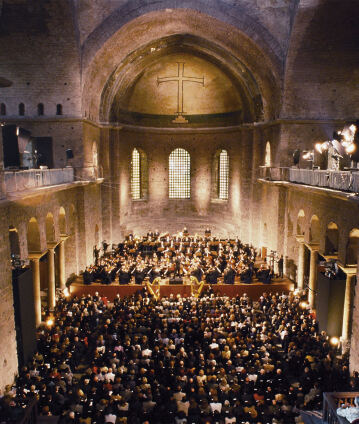2001 Europakonzert from Istanbul with Mariss Jansons and Emmanuel Pahud

In 2001 the Berliner Philharmoniker gave their annual Europakonzert at the easternmost tip of the Continent in the venerable Hagia Irene in Istanbul. The conductor was Mariss Jansons and the programme comprised Haydn’s “Surprise” Symphony and Mozart’s Second Flute Concerto, with Emmanuel Pahud as the soloist, together with a key work of Romantic programme music, Berlioz’s Symphonie fantastique.
Every year the Berliner Philharmoniker mark the anniversary of the day they were founded on 1 May 1882, the date on which fifty-four musicians formed a democratically run ensemble that was determined to survive without the support of the State or of a well-to- do patron. Their courage was rewarded and the story of their success has continued right down to the present day. IIn 2001, it took the orchestra to Istanbul for the very first time, to the easternmost tip of Europe, where it gave its 11th Europakonzert in the Hagia Eirene, the “Church of Holy Peace”.
On the podium was the Latvian conductor Mariss Jansons, who was then the principal conductor in Pittsburgh and who has always been a welcome guest in Berlin. He began the programme with Haydn’s Symphony No. 94 (“Surprise”), one of the composer’s ten “London” Symphonies. According to the press, Jansons “had obviously been studying period performance techniques”, resulting in “light, bright textures, relatively fast speeds and a phrasing which would have had old Karajan turning in his grave”. Next up was Mozart’s D major Flute Concerto, which was given a brilliant performance by Emmanuel Pahud, the orchestra’s principal flautist since 1992, who brought to the piece his hallmark digital dexterity and velvety mellow tone. At no point does the work betray the fact that Mozart, by his own admission, could not abide the flute.
Following the intermission, Jansons conducted Berlioz’s Symphonie fantastique, a key work of Romantic programme music. It tells of a love story that ends badly, its five movements accompanying the “narrator” on various adventures that extend from a magnificent ball to the narrator’s own execution when he thinks he has murdered his lover out of jealousy. The work culminates in a Witches’ Sabbath. The result is a gripping mixture of sex and crime that has undoubtedly contributed to the work’s lasting success, even if Berlioz himself hoped that “on its own the symphony will provide sufficient musical interest independently of any dramatic intention”.
© 2001 EuroArts Music International
Categories
Artists
Our recommendations
- 2017 Europakonzert from Cyprus with Mariss Jansons and Andreas Ottensamer
- The 1995 Europakonzert from Florence with Zubin Mehta and Sarah Chang
- 2002 Europakonzert from Palermo with Claudio Abbado and Gil Shaham
- 2019 Europakonzert with Daniel Harding from the Musée d’Orsay, Paris
- Europakonzert 2011 from Madrid with Simon Rattle and Cañizares
- Simon Rattle conducts the 2016 Europakonzert in Røros